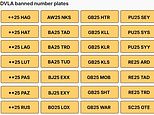

Global chip stocks fell sharply, with ASML, Nvidia and TSMC posting declines amid reports of tighter export restrictions from the U.S. and a ramp-up of geopolitical tensions fueled by comments from former U.S. President Donald Trump.
ASML's Netherlands-listed shares were down 11%, while Tokyo Electron shares in Japan closed nearly 7.5% lower. Arm, AMD, Marvell, Qualcomm and Broadcom closed down more than 7%.
The moves came after Bloomberg on Wednesday reported that the Biden administration is considering a wide-sweeping rule to clamp down on companies exporting their critical chipmaking equipment to China.
Washington's foreign direct product rule, or FDPR, allows the U.S. to put controls on foreign-made products even if they use the smallest amount of American technology. This can affect non-U.S. companies.
CNBC has reached out to the U.S. State Department, the Bureau of Industry and Security, and the Office of the U.S. Trade Representative for comment on the report.
ASML's stock drop came even as it reported earnings that beat market expectations for the second quarter. However, 49% of its sales over the period took place in China — highlighting how much is at risk for the firm, in the event of tighter restrictions. ASML makes the machines that are required to manufacture the most advanced chips in the world.
Comments from Trump, a Republican, added further negative sentiment to semiconductor stocks.
The former president said Taiwan should pay the U.S. for defense, in an interview with Bloomberg Businessweek published Tuesday. He also claimed Taiwan took "about 100%" of America's semiconductor business.
The remarks have thrown doubt over the U.S. commitment to defend Taiwan if Trump becomes president and in the event of an attack by China, which sees the democratically governed island as part of its territory.
The Taiwan-listed shares of Taiwan Semiconductor Manufacturing Co. closed down 2.4% on Wednesday.
The geopolitical tensions also weighed on chip stocks in the U.S. The VanEck Semiconductor ETF closed down over 7%. Super Micro Computer and Applied Materials were among the other U.S.-listed laggards in trading.











